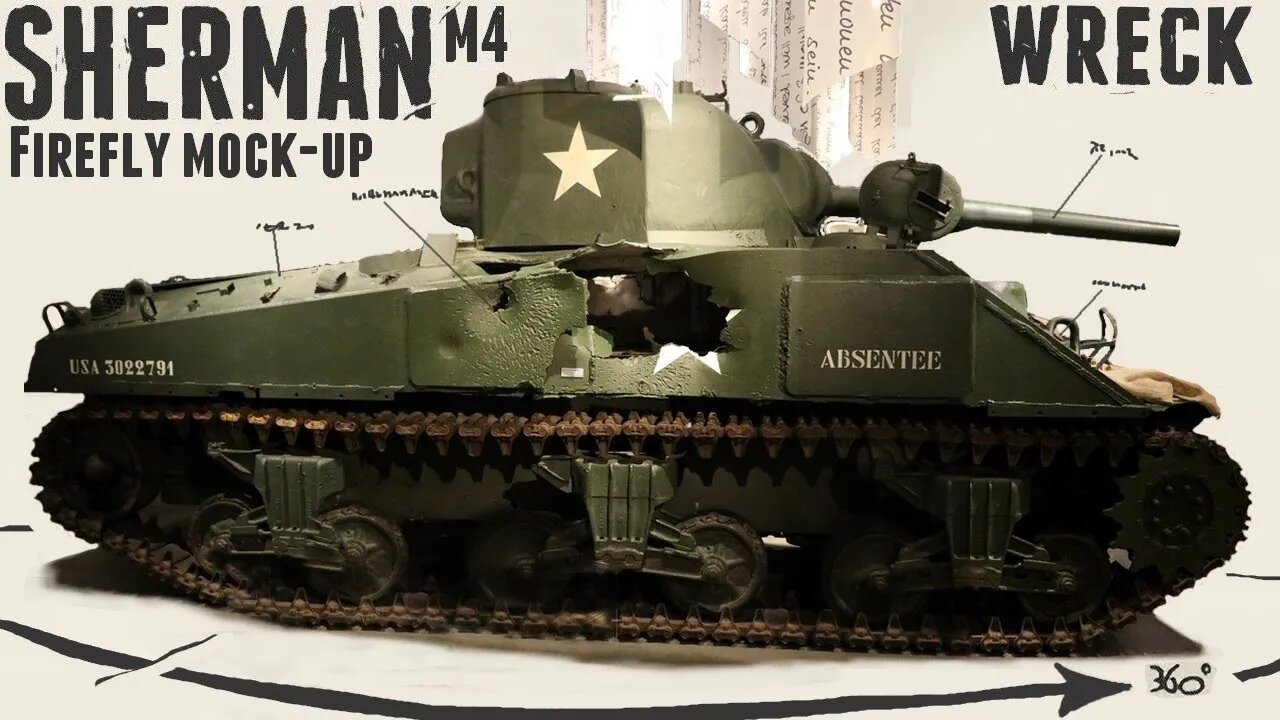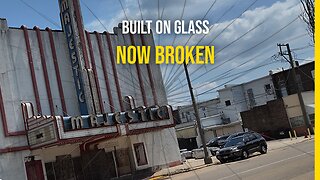Premium Only Content

M4 Sherman Firefly M4A4 mock-up - Walkaround - Bastogne War Museum.
M4 Sherman Firefly M4A4 mock-up - Walkaround - Bastogne War Museum.
The Sherman Firefly (The nickname "Firefly" was adopted due
to the bright muzzle flash of the main gun.) was a tank used by
the United Kingdom during WWII and developed as a stopgap until
future British tank designs came into service.
It was based on the US M4 Sherman, but was fitted with the more powerful
British 17-pounder anti-tank gun as its main weapon.
Development of the Firefly would start in 1943 byW. G. K. Kilbourn,
a Vickers engineer working for the DTD, his work would be based on
the work of Major George Brighty, Kilbourn solved theearly
design problems with the gun cradle and the recoil system.
By October and November 1943, enthusiasm began to grow for the project.
Even before final testing had taken place in February 1944,
an order for 2,100 Sherman Firefly tanks was placed.
Fireflies were introduced to armoured brigades and divisions in
the 21st Army Group in 1944, just in time for the Normandy landings.
Firefly was perhaps the most valued tank by British and other
Commonwealth commanders, as it was the only tank in
the British Army able to reliably penetrate the frontal
armour of Panthers and Tigers at the standard
combat ranges in Normandy.
The firefly did have a drawback and that was the flash
after firing the gun, the flash was so brilliant that both gunner
and commander need to blink at the moment of firing.
Otherwise they will be blinded for so long that they will not see
the shot hit the target. The muzzle flash spurts out
so much flame that, after a shot or two, the hedge or undergrowth
in front of the tank is likely to start burning.
This would also make the tank easy to spot by the Germans
were instructed to eliminate Fireflies first.
Despite being a high priority target, Fireflies appear to have had
a statistically lower chance of being
knocked out than standard Shermans, probably due more to
how they were employed than to the effectiveness of
the camouflaging of the long barrel.
Production would end in 1945 after 2,100-2,200 vehicles were produced
and after the war the Firefly would be replaced by the Comet and the Centurion.
But it would still be used by other countries like Belgium,
the Netherlands, Argentina and Italy.
This M4 Sherman is misleadingly represented as
a WWII vehicle.
The vehicle is actually a post war tank
The hull came from a Belgian barracks were it was
used as a range target, the damaged you see
was all done on hte range.
It was send to the Bastogne Barracks and restored in
2012, and it became a composed and a different turret
was used to restore it.
The turret was probably one of a few placed at roads
leading into Bastogne, these were place around Bastogne
after the war, and all came from Sherman tanks found
around Bastogne.
These Turrets would mark the frontlines during
the Battle of the Bulge and would show how far
the Germans would have come.
After the museum was renovated the tank
was placed in it's current display.
■ So want to help keep me and the channel going?
Please consider buying a cup of coffee!
https://www.buymeacoffee.com/panzerpi...
supporting me on Patreon and Buymeacoffee will get you access to extra content for three channels in total.
■ Support me on my Patreon https://www.patreon.com/Panzerpicture
■ Or buy me a Coffee on https://www.buymeacoffee.com/panzerpi...
■ Store: teespring.com/stores/panzerpicture-2
■ Information obtained from several sites.
■ Wikipedia
■ tanks-encyclopedia
■ the.shadock.free.fr/Surviving_Panzers
■ preservedtanks
■ pantser.net
■ the.shadock.free.fr/Tanks_in_France
■ Some music is from the YouTube Audio Library.
■ Music used:
EpidemicSound.com
Copyright fair use notice
All media used in
this video is used for
the purpose of education
under the terms of
fair use.
All footage and images
used belong to their
copyright holders.
-
 1:12:40
1:12:40
Wendy Bell Radio
7 hours agoPet Talk With The Pet Doc
21.2K24 -
 LIVE
LIVE
FusedAegisTV
11 hours agoStreet Fighter 6 FINALS, CS2 Semifinals | $1,250,000 | Riyadh, Saudi Arabia EWC 2025 !estv
130 watching -
 40:42
40:42
SouthernbelleReacts
1 day ago $0.02 earned😂 American Pie (1999) Reaction | Iconic Teen Comedy, High School Chaos & 90s Nostalgia 🥧
7.84K1 -
 LIVE
LIVE
LumpyPotatoX2
1 hour agoBecome a HellDiver Today - #RumbleGaming
118 watching -
 LIVE
LIVE
Midnight In The Mountains
3 hours agoGaming w/ PER·SE·VER·ANCE | Sassy Saturday Fortnite | with the Midnights!
56 watching -
 LIVE
LIVE
shyboyking
1 hour agoThe Bots Of The Bots !!!😎
67 watching -
 24:06
24:06
True Crime | Unsolved Cases | Mysterious Stories
5 days ago $0.13 earnedShe Traveled Alone… and Never Came Back – 5 Mysterious Unsolved Cases (Part 6)
6.43K5 -
 27:23
27:23
Clickbait Wasteland
15 hours ago $0.02 earnedAsking New Yorkers Who They Support For Mayor: Staten Island
10.6K3 -
 16:58
16:58
World2Briggs
23 hours ago $0.01 earnedThe California Rant: Point Blank With No Fluff or BS. California Gold?
6.72K2 -
 17:49
17:49
Chris Harden
1 day ago $0.01 earnedThe Glass Capital That Shattered | The Decline of Streator, Illinois
5.55K1